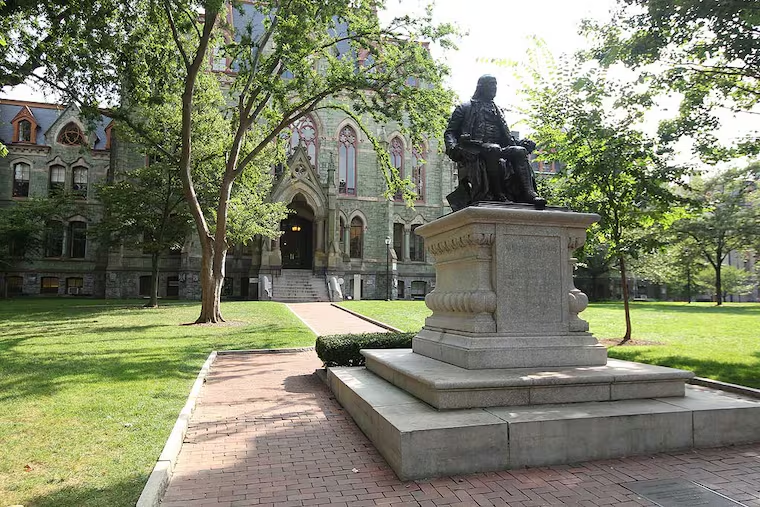Thousands of Penn students face penalties for failure to comply with COVID-testing and proof of immunization
Penn said it will prevent students from registering for spring classes and from entering campus buildings for classes.

The University of Pennsylvania said it will prevent students from early registration for spring classes and block access to campus buildings if they fail to comply with COVID-19 immunization and testing requirements.
Other universities have announced similar measures around COVID-19 protocols in recent weeks as the semester continues.
At Penn, more than 1,000 students, mostly graduate and professional studies students, were told they would not have access to early registration for spring classes if they do not upload their immunization cards by Friday or seek an exemption, said Benoit Dubé, Penn’s associate provost and chief wellness officer.
“You’ll get slim pickings if you don’t address this,” he said. “You want access to early registration to get the classes that you want, not just the classes that are left.”
» READ MORE: Free tuition anyone? What local universities are doing to entice or punish students around COVID-19 protocols
Penn also this week notified more than 7,000 students that they could be banned from entering buildings and attending classes starting Tuesday if they don’t report for required COVID-19 testing by this Saturday. That’s about one-third of the students that are required to participate in testing.
It’s not the first time such a notice has gone out and it’s not unusual for students to delay testing, Dubé said. Penn has been sending out notices since the semester began and some students have temporarily had their building access revoked until they got tested, Dubé said. The school has not had to take other steps beyond that to bring students into compliance, he said.
Last week, more than 9,000 students got a notice, causing concern for academic leaders, given that it was after fall break and midterms were scheduled, he said. As a result, the university made a onetime exception last week on restricting building access, he said.
» READ MORE: Vaccinated vs. unvaccinated roommates: As college starts, some parents and students have concerns
“It’s important for our students to know and be aware that there are mechanisms in place that hold people accountable to the system that we have put out to maintain a healthy and safe environment for the entire Penn community,” he said.
About 99% of Penn undergraduates are vaccinated, but the university is still requiring students to test every other week. Those who are not vaccinated must be tested twice a week.
“We monitor compliance every two weeks for the entire student body,” he said.
Penn enrolls about 26,550 undergraduate, graduate, and professional students, and all are required to participate in the testing.
Dubé said the issue got more attention this week after students received reminders about the testing via academic leaders.
In an email to students on Wednesday, Paul Sniegowski, dean of the School of Arts and Sciences, said students would not be able to attend classes if they didn’t comply with the testing and noted that 1,549 of the 7,231 students not in compliance are in that school, according to the Daily Pennsylvanian, the student newspaper.
The university’s decision to put a hold on registrations for lack of immunization information also is not new, Dubé said.
Penn for years has required students to provide immunization information for other vaccines and has had to take the same step of withholding registration for those who don’t comply, he said. Some students, such as those coming from other countries, don’t have access to all the vaccines and Penn gives them until October to come into compliance before a registration hold warning is issued, he said.
“Just last week, 2,500 students were put on registration hold,” he said. “This number is about one-third less than the number of students that were put on registration hold in previous years. This year, we instituted a separate process for the COVID-19 immunization requirement that resulted in the 1,100 students” that face a registration hold if they don’t get tested.
In January, the university for the first time plans to institute the same requirement for the flu vaccine, Dubé said.
Dubé emphasized that most Penn students comply with masking, testing and other COVID-19 protocols, and that the campus’ COVID-19 positivity rate remains low, according to the university’s dashboard.